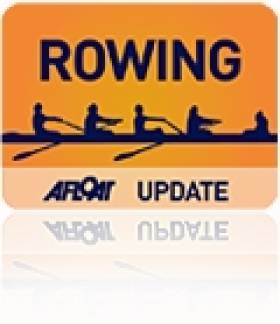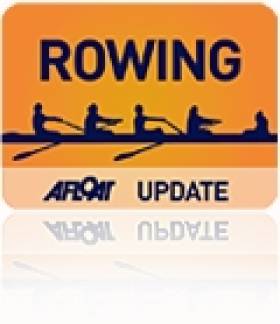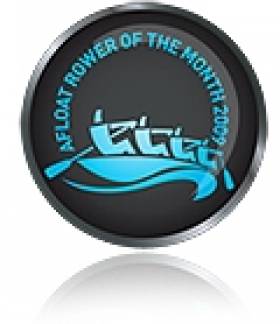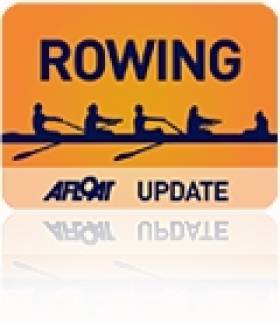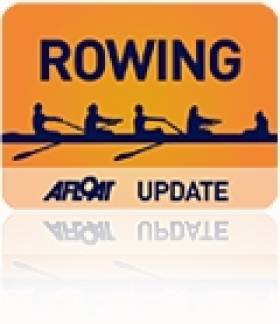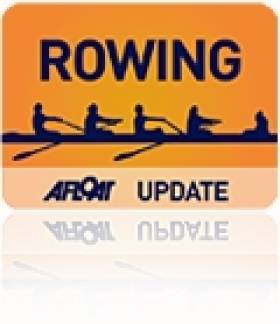Displaying items by tag: UCD
First Afloat Rower of the Month for 2016 Named
#Rower of the Month: The Afloat Rower of the Month for January 2016 is Paul O’Donovan. The UCD oarsman produced a remarkable time of six minutes 7.5 seconds at the Irish Indoor Rowing Championships to smash the Irish record for a lightweight – the time of 6:14.6 set by his brother Gary earlier in the open competition. Paul is 21 and competed in the under-23 section. Sanita Puspure and Claire Lambe were amongst those who set new records at the championships. Paul O’Donovan and Gary O’Donovan will compete for Ireland as a lightweight double scull at the Olympic Games in Rio de Janeiro later this year.
Rower of the Month awards: The judging panel is made up of Liam Gorman, rowing correspondent of The Irish Times, and David O'Brien, editor of Afloat magazine. Monthly awards for achievements during the year will appear on afloat.ie and the overall national award will be presented to the person or crew who, in the judges' opinion, achieved the most notable results in, or made the most significant contribution to rowing during 2016. Keep a monthly eye on progress and watch our 2016 champions list grow.
Larsen Sets Good Time at Leinster Indoor Test
#Rowing: Breanna Larsen of Garda Boat Club set a fine personal best time of seven minutes 7.9 seconds at the Leinster Indoor Rowing competition at Garda Rowing Club on Saturday. Oblivious to the wind and rain outside, the women rowers from Garda, UCD and Trinity competed and set some good times. Trinity won the award for best female club, but Aileen Crowley of UCD took the under-23 title, clocking an impressive 7:13.30.
Leinster Indoor Competition, Garda Boat Club, Saturday (Selected Results, 2,000m unless stated) Full Results Attached
Men
Open: 1 D Kelly 6:17.8, 2 C McShane 6:54.8, 3 P Murphy 7:12.4. Novice (1,000): C Harrington 3:11.7. Jun 18: 1 N Beggan 6:51.8, 2 J Phelan 6:53.3, 3 A Lennon 6:56.0. Jun 16: R Quinn 6:54.9.
Masters 30+: D Quinn 6:31.40. Non-Rower (1,000m); 2:59.8.
Women
Open: 1 B Larsen 7:07.90 (PB), M Moore 7:20.10, 3 S O’Brien 7:23.6. Under-23: A Crowley 7:13.30. Junior 18: E Lambe 7:18.90, 2 C Feerick 7:29.6, 3 J Coleman 7:48.7. Jun 16: S Maxwell 7:49.6. Lightweight: G Crowe 7:33.90.
Novice (1,000m): B O’Brien 3:29.8.
UCD 1 Victorious at IUSA Easterns in Kerry
The 24 teams from UCD, DCU, DIT, CIT, UCC, NUIG, Queens and Trinity were greeted with sunny blue skies as they arrive down to Dingle Sailing Club on Saturday morning the 17th of October to compete in the first day of the 2015 IUSA Easterns. The winds were light in the harbour and struggling to reach five knots. While the boats were being rigged, course being set and committee getting in position the breeze began to rise as if to welcome the sailors to the waters of Dingle.
The races got off to a slow start due to problems arising with the jury boats in the flooding tide, making areas of the course to shallow to sail in. Once these problems were remedied the races flew by. Locals and tourists looked on from the grass area as they were treated to watch very close racing. As the sun began to set and the temperatures dropped the committee called racing for the day after 61 tight races. At the end of the day the leaders of the gold, silver and bronze round robins were UCC1, UCD3 and UCD5 respectively.
An earlier first gun saw the teams on the water for 9:30am on Sunday morning and racing got underway immediately. The racing went straight into the quarterfinals with best of 3 matches for the gold and silver fleet and best of one for the bronze fleet. The finals were UCD1 versus CIT1 in the gold fleet, TCD3 versus TCD4 in the silver fleet, and TCD5 versus TCD6 in the bronze fleet with UCD1, TCD3 and TCD5 all coming out victorious.
UCD Students Place Third In 2015 Student Yachting World Cup
#SYWoC - The team from University College Dublin have place third in this year's Student Yachting World Cup.
Ryan Glynn (skipper), Ronan Jones, Colin O’Mahoney, Cliodhna Conolly, Cian Cahill and Emma Reidy beat such noble institutions as Cambridge and Oxford to the bronze position, behind the University of Southampton and SYWoC winners from the Ecole Polytechnique Federale de Lausanne in Switzerland.
As previously reported on Afloat.ie, it was UCD's fourth participation in the week-long racing event, where they previously lifted the cup in 2012.
Sailors from Trinity College Dublin – also previous cup winners, in 2006 – were also competing but failed to make the top 10.
Trinity are Senior Eights Champions of Ireland
#ROWING: Trinity won the senior eights Championship of Ireland for the first time since 2008 at the National Rowing Centre today. They started well and pushed into a one-length lead at 1,000 metres over UCD/Old Collegians, with NUIG/Grainne Mhaol not far behind. Trinity saw off repeated pushes to win by just under a length from UCD/Old Collegians.
In the women’s senior eights UCD had a similar race pattern, but had a little more to spare over their rivals, UCC/Skibbereen and Trinity.
The men’s intermediate double gave Garda’s Damien Kelly and Ronan Allen a chance to impress. They dominated their race, as did Skibbereen in the women’s junior quadruple sculls – a win which brought Skibbereen up to 150 wins and level with Neptune on the Pots won at the Irish Championships. Fittingly, Aoife and Niamh Casey, daughters of Dominic Casey, were in the winning boat.
Dervla Forde won the women’s intermediate single sculls title – after a fine battle with Sarah Quinn of Belfast Boat Club, while Portora finished off a good Championships for them with wins in the men’s junior pair and women’s club eight.
Irish Rowing Championships, National Rowing Centre, Cork, Day Three (Selected results)
Men
Eight – Senior: 1 Trinity (G Mahon, I Hurley, J Magan, M Corcoran, P Moreau, M Kelly, L Hawkes, D Butler; cox: C Flynn) 5 mins 37.45 seconds, 2 UCD/Old Collegians 5:40.41, 3 NUIG/Grainne Mhaol 5:42.05, 4 UCC/Presentation 5:56.76.
Four – Club, coxed: 1 Queen’s 6:28.23, 2 UCD A 6:30.77, 3 NUIG A 6:36.48.
Pair – Intermediate: 1 Commercial A 6:47.94, 2 Skibbereen 6:55.20, 3 Portora 7:00.19. Junior: 1 Portora B 6:56.46, 2 St Joseph’s A 6:58.25, 3 Portora A 7:04.65.
Sculling, Double – Intermediate: 1 Garda 6:49.10, 2 Lee 6:41.24, 3 Waterford 6:42.64. Junior: 1 Shandon 6:40.27, 2 Castleconnell A 6:50.48, 3 Cork BC B 6:55.56.
Lightweight Single: 1 Skibbereen (J Ryan) 7:09.17, 2 Skibbereen (McCarthy) 7:12.63, 3 St Michael’s (D O’Connor) 7:15.40.
Women
Eight – Senior: 1 UCD (D Callanan, R Gilligan, C Harrison, B Larsen, O Finnegan, A Crowley, A O’Riordan, K O’Connor; cox: L Mulvihill) 6:25.85, 2 UCC/Skibbereen 6:30.31, 3 Trinity A 6:31.62. Club: 1 Portora 6:41.27, 2 Commercial A 6:46.19, 3 NUIG 6:47.67.
Four – Intermediate, coxed: 1 NUIG 7:09.66, 2 Commercial 7:18.28, 3 Shannon 7:23.16.
Pair – Junior: 1 Bann 7:42.60, 2 Portora 7:47.30, 3 Lee 7:51.35.
Sculling, Quadruple – Junior: 1 Skibbereen 6:50.32, 2 Bann A 6:57.37, 3 Bann B 6:59.29.
Single – Lightweight: 1 Tribesmen (S McCrohan) 7:46.48, 2 Commercial (Sarah Dolan) 7:50.22, 3 Skibbereen (O Hayes) 8:00.39. Intermediate: 1 Cork (D Forde) 7:50.85, 2 Belfast BC (S Quinn) 7:51.99, 3 Belfast BC (Mulligan) 8:00.32.
McCrohan and UCD/Old Collegians Composite Win in Cork
#Rowing: Siobhan McCrohan won the won the women’s senior single sculls for Tribesmen and the experienced Old Collegians/UCD crew took the men’s senior quadruple at the Irish Championships this afternoon.
In the junior women’s eight, Portora had to see off a challenge by Bann, while Shandon bested Castleconnell in an exciting race to win the junior men’s quadruple – their third in-a-row.
Queen’s won the men’s novice eight, beating UCD and Trinity, while Margaret Cremin of Lee won the club single sculls and Andrew Goff of Waterford the men’s intermediate single.
Irish Rowing Championships, National Rowing Centre, Cork (Day Two, Selected Results)
Men
Eight – Intermediate: 1 Trinity 5:46.51, 2 UCD A 5:49.27, 3 Queen’s 6:08.61. Novice: 1 Queen’s 6:18.97, 2 UCD 6:25.66, 3 Trinity 6:38.63.
Four – Junior, coxed: 1 Portora 6:36.84, 2 St Joseph’s 6:37.0, 3 Athlunkard 6:45.18.
Pair – Senior: 1 UCC 7:03.18, 2 NUIG 7:10.16, 3 Carlow 7:12.51.
Sculling, Quadruple – Senior: 1 Old Collegians/UCD 6:07.97, 2 Commercial 6:14.51. Junior: 1 Shandon 6:16.78, 2 Castleconnell 6:17.49, 3 Cork BC A 6:28.24.
Single – Intermediate: 1 Waterford (A Goff) 7:23.95, 3 Athlone (P Munnelly) 7:34.43. Club: 1 Shandon (C Merz) 7:42.94, 2 Clonmel (D Lynch) 7:44.96, 3 Lee (D Larkin) 7:45.94.
Women
Eight – Novice: 1 Commercial 6:59.55, 2 Queen’s 7:13.67, 3 Trinity 7:13.67. Junior: 1 Portora 6:49.43, 2 Bann 6:52.99, 3 Shannon 7:13.95.
Sculling, Double – Intermediate: 1 Skibbereen 7:36.62, 2 St Michael’s 7:45.87, 3 Belfast BC 7:48.80.
Single – Senior: 1 Tribesmen (S McCrohan) 8:06.29, 2 Commercial (Sarah Dolan) 8:12.04, 3 Skibbereen (O Hayes) 8:13.99. Club: 1 Lee (M Cremin) 8:33.88, 2 Garda (J Ryan) 8:46.29, 3 Queen’s (R Brown) 8:51.52. Junior: 1 Cork (D Forde) 8:07.98, 2 Skibbereen (E Hegarty) 8:18.01, 3 Offaly (A Mooney) 8:21.91.
Trinity Senior Eight are Afloat Rowers of the Month
#ROWING: The Afloat Rowers of the Month for June are Trinity’s men’s senior eight. The Dublin University Boat Club crew had a convincing win in the Division One final at Cork Regatta, outpacing UCD and NUIG/Gráinne Mhaol. They crew took the Leander trophy, one of the most impressive prizes on offer in Irish sport. Well done to: Gearóid Mahon, Ian Hurley, John Magan, Michael Corcoran, Patrick Moreau, Mark Kelly, Liam Hawkes, David Butler and cox Cian Flynn.
Rower of the Month awards: The judging panel is made up of Liam Gorman, rowing correspondent of The Irish Times and David O'Brien, Editor of Afloat magazine. Monthly awards for achievements during the year will appear on afloat.ie and the overall national award will be presented to the person or crew who, in the judges' opinion, achieved the most notable results in, or made the most significant contribution to rowing during 2015. Keep a monthly eye on progress and watch our 2015 champions list grow.
Trinity Eight In Command at Cork Regatta
#ROWING: Trinity won the men’s eights impressively at the Cork Regatta at the National Rowing Centre today. The college crew took an early lead and extended it to a length at 500 metres. The chasing UCD and NUIG/Grainne Mhaol crews looked never likely to catch Trinity from that point on. The winning margin was over five seconds, with UCD taking second. NUIG’s intermediate crew won the women’s eights by an even bigger margin of over seven seconds from Skibbereen’s junior 18A eight.
Cork Regatta, National Rowing Centre (Selected Results)
Sunday
Men
Eight – Div One – A Final: 1 Trinity (senior) 5:40.667, 2 UCD (intermediate) 5:45.957, 3 NUIG/Grainne Mhaol 5:46.533; 4 Queen’s (Club One) 5:54.94; 5 St Joseph’s (jun 18A) 6:02.257. B Final: UCD (Club One) 6:01.593. C Final: Trinity (Club One) 6:28.997.
Four – Div One – A Final: 1 NUIG/Grainne Mhaol (sen) 6:07.807, 2 UCC A 6:10.83, 3 Carlow (sen) 6:15.543. Four, coxed – Div Two – A Final: Skibbereen (Club Two) 6:43.837. B Final: Trinity (Club Two) 7:04.517; 3 Col Iognaid (jun 16) 7:06.357.
Sculling
Quadruple – Div Two – A Final: Cork (jun 16) 6:45.45; 6 Lee (Club Two) 7:03.56. B Final: Workmans (jun 16) 6:59.8; 4 Workman’s (jun 18B) 7:06.817. C Final: Carlow (jun 16) 7:05.697.
Double – Div One – A Final: 1 Old Collegians (D Neale, S Jacob; sen) 6:29.50, 2 Portadown/Skibbereen (sen) 6:34.43, 3 Shandon (jun 18A) 6:44.873. B Final: Waterford (inter) 6:46.473. C Final: Lee (inter) 6:48.227; 4 Methody (Club One) 7:10.627.
Single – Div Two – A Final: Belfast BC (A Murray; jun 18B) 7:35.483, 2 Cappoquin (Aherne; club two) 7:5.052; 4 Lee (Jackson, jun 16) 7:49.427. B Final: Clonmel (Dundon; jun 16) 7:49.347. C Final: St Michael’s (O’Byrne; jun 16) 7:48.40.
Women
Eight – Div One – A Final: 1 NUIG (inter) 6:43.177, 2 Skibbereen (jun 18A) 6:50.87, Commercial (inter) 6:57.593. Four – Div One – A Final: 1 Skibbereen (jun 18A) 7:08.330, 2 Shannon (sen) 7:12.137, 3 Skibbereen (sen) 7:27.62. Div Two, coxed – A Final: Queen’s A (Club Two) 7:27.26; 6 St Michael’s (jun 16) 8:32.17.
Sculling
Double – Div One – A Final: 1 Skibbereen (A Casey, E Hegarty; jun 18A) 7:28.957, 2 Lee (jun 18A) 7:33.43, 3 St Michael’s (inter) 7:43.430. B Final: Belfast BC A (inter) 7:39.570.
Single – Div Two – A Final: Lee (Cremin; Club Two) 8:16.437; Workman’s (Burns; jun 16) 8:32.55; 6 Shandon (jun 18B) 8:59.37. B Final: Cork (jun 16) 8:52.337. C Final: Lee Valley (jun 16) 8:56.26.
NUIG/Grainne Mhaol Four See Off Strong UCC Challenge
#ROWING: UCC gave them a good race, but NUIG/Grainne Mhaol moved away in the closing stages to prove themselves the top men’s four at Cork Regatta. The experience of Sean Jacob and Dave Neale also told in the men’s double scull, with the Ireland under-23 double of Sam McKeown and Andrew Griffin had to give way to the Old Collegians men. The women’s four and double went to young Skibbereen crews: Aoife Casey and Emily Hegarty, who are both 16, were part of the winning four and then switched into the double and won again.
Cork Regatta, National Rowing Centre (Selected Results)
Sunday
Men
Four – Div One – A Final: 1 NUIG/Grainne Mhaol (sen) 6:07.807, 2 UCC A 6:10.83, 3 Carlow (sen) 6:15.543. Four, coxed – Div Two – A Final: Skibbereen (Club Two) 6:43.837. B Final: Trinity (Club Two) 7:04.517; 3 Col Iognaid (jun 16) 7:06.357.
Sculling
Double – Div One – A Final: 1 Old Collegians (D Neale, S Jacob; sen) 6:29.50, 2 Portadown/Skibbereen (sen) 6:34.43, 3 Shandon (jun 18A) 6:44.873. B Final: Waterford (inter) 6:46.473. C Final: Lee (inter) 6:48.227; 4 Methody (Club One) 7:10.627.
Single – Div Two – A Final: Belfast BC (A Murray; jun 18B) 7:35.483, 2 Cappoquin (Aherne; club two) 7:5.052; 4 Lee (Jackson, jun 16) 7:49.427. B Final: Clonmel (Dundon; jun 16) 7:49.347. C Final: St Michael’s (O’Byrne; jun 16) 7:48.40.
Women
Four – Div One – A Final: 1 Skibbereen (jun 18A) 7:08.330, 2 Shannon (sen) 7:12.137, 3 Skibbereen (sen) 7:27.62.
Sculling
Double – Div One – A Final: 1 Skibbereen (A Casey, E Hegarty; jun 18A) 7:28.957, 2 Lee (jun 18A) 7:33.43, 3 St Michael’s (inter) 7:43.430. B Final: Belfast BC A (inter) 7:39.570.
UCD/Old Collegians Fastest Quadruple at Cork Regatta
# Rowing: The composite quadruple from UCD and Old Collegians were impressive victors at Cork Regatta. Commercial, who beat them at Dublin Metropolitan, were left behind as the crew of Dave Neale, Albert Maher, Sean Jacob and new man Turlough Hughes won well. Skibbereen won the women’s Division One quadruple, while Commercial won the women’s Division Two eights in an exciting race. UCD’s intermediates were the top coxed four – beating Queen’s in a good race.
Cork Regatta, National Rowing Centre (Selected Results)
Saturday
Men
Four, coxed – Div One – A Final: 1 UCD (inter) 6:27.52, 2 Queen’s (inter) 6:28.52, 3 UCD B (inter) 6:29.16; 4 Skibbereen (sen) 6:38.0. B Final: St Michael’s (inter) 6:53.83; 2 St Michael’s (jun 18A) 6:39.19.
Sculling
Quadruple – Div One – A Final: 1 Old Collegians/UCD (sen) 5:58.95, 2 Commercial (sen) 6:06.11, 3 Castleconnell (jun 18A) 6:15.80. B Final: Cork B (jun 18A) 6:24.97.
Double – Div Two – A Final: 1 Cork C (jun 16) 7:07.81, 2 Lee (jun 16) 7:14.63, 3 Shandon A (club two) 7:20.63; 6 Carlow (jun 18B) 7:27.78. B Final: Waterford A (jun 16) 7:26.43. C Final: Shannon B (jun 18B) 7:22.38.
Women
Eight – Div Two – A Final: 1 Commercial (Club Two) 6:47.24, 2 Queen’s (Club Two) 6:51.15, 3 Col Iognaid (Jun 16) 7:06.11.
Four – Div One, coxed – A Final: 1 NUIG (inter) 7:15.85, 2 Shannon (sen) 7:20.47, 3 Commercial (inter) 7:21.80. B Final: Garda (Club One) 7:48.47.
Sculling
Quadruple – Div One – A Final: 1 Skibbereen (jun 18A) 6:51.67, 2 Lee (Jun 18A) 7:00.6, 3 Galway (jun 18A) 7:27.46.
Double – Div Two – A Final: 1 Workmen’s (jun 16) 7:43.13, 2 Cork (Club Two), Cork (jun 16) 7:48.08, 4 Shandon (jun 18B) 7:48.74. B Final: Lee (jun 18B) 8:05.00. C Final: Workmen’s (jun 18B) 8:41.15.


























